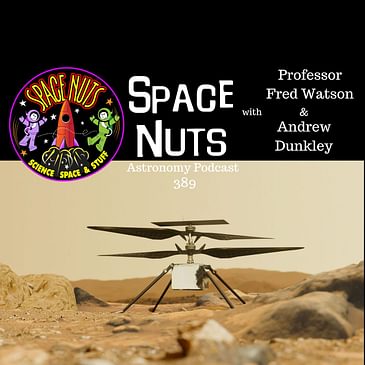Finally, the hosts examine speculative ideas from listeners relating to ambitious, large-scale engineering projects, such as the Solar Pergola and moving planets. Reminding us that while such concepts may dazzle the imagination, the practical feasibility and risks associated with these ideas are significant. The focus on prudence and consideration of potential unintended consequences underscores the responsibility that comes with technological advancements, especially when meddling with natural systems of the cosmos. It's The resources mentioned in this episode are: · Visit spacenutspodcast.com or spacenuts.io to submit your questions for the next all-question episode. · Check out the Space Nuts shop on the website for Space Nuts merchandise, including t-shirts. · Become a patron of Space Nuts to support the podcast and gain access to exclusive benefits. · Listen to the Space Nuts podcast on Apple Podcasts, Spotify, iHeartRadio, or your favorite podcast player. · Stream Space Nuts on demand at bitesz.com. Timestamped summary of this episode:
00:00:00 - Introduction and Ingenuity's End
Andrew Dunkley introduces the topics for this episode, including the end of the mission for the ingenuity helicopter on Mars after suffering damage from a landing mishap.
00:03:42 - Slim Moon Lander's Upside-Down Landing
The discussion moves to the slim moon lander's successful but tilted landing on the moon, leading to challenges with solar panel orientation. Despite the setback, some scientific experiments are being carried out.
00:13:13 - Arno Penzias' Legacy
The passing of physicist Arno Penzias is noted, highlighting his groundbreaking discovery of cosmic microwave background radiation, which confirmed the Big Bang theory and contributed to the decline of the steady state theory of the universe.
00:16:20 - Quirks of Dark Matter in the Milky Way
The conversation shifts to an exploration of the unique behavior of dark matter in the Milky Way, particularly in its extremities, suggesting that our galaxy's dark matter may exhibit distinct characteristics compared to other galaxies.
00:16:31 - Closing Remarks
Andrew Dunkley and Professor Fred Watson wrap up the episode, thanking listeners for tuning in and hinting at the intriguing nature of the dark matter discussion as a teaser for future episodes.
00:17:09 - Understanding the Galaxy's Geometry
Fred and Andrew discuss the challenges of mapping our galaxy's geometry, including the difficulty of establishing details about our own galaxy due to our position within it.
00:19:10 - The Mystery of Galaxy Rotation
The conversation explores the discovery of the unusual flat rotation curve of galaxies, leading to the theory of galaxies being embedded in a dark matter halo. This discovery challenges previous expectations about the distribution of dark matter.
00:23:38 - Mars: Methane Burps
They delve into the detection of methane on Mars and the potential causes, including the possibility of seasonal changes in Mars's atmosphere bringing the methane to the surface. This discovery raises questions about the origin of methane on Mars.
00:29:34 - Listener Question: Meteor Showers
Ray from California raises an interesting question about the composition and behavior of meteors during showers, pondering whether the process involves vaporization, oxidization, or both. Fred and Andrew discuss the potential explanations for the observed phenomena.
00:33:27 - Peer Review Process
The conversation touches on the lengthy process of peer reviewing research in astronomy, highlighting the time and effort required to ensure the accuracy and validity of published findings. Fred shares insights into the challenges and rewards of peer reviewing scientific work.
00:34:17 - Red Pens and Solar Pergolas
The hosts discuss using red pens and the idea of a solar pergola to cool the planet.
00:35:35 - Engineering Challenges
The hosts analyze the engineering challenges of building a solar pergola and its potential impact on the planet's temperature.
00:39:40 - Megastructure and Civilization
The hosts delve into the concept of building a megastructure and its potential impact on reclassifying civilization.
00:40:54 - Hyper Mega Engineering and Terraforming
The hosts discuss the feasibility of moving planets and terraforming, exploring the complexities and potential limitations of such endeavors.
00:45:48 - Listener Engagement and Patreon
The hosts encourage listener engagement, mention the Patreon supporters, and invite questions for the next episode.
Become a supporter of this podcast: https://www.spreaker.com/podcast/space-nuts--2631155/support.



